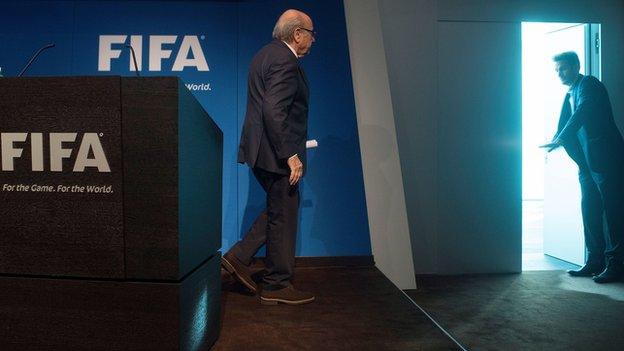Fifa crisis: Sepp Blatter 'raging against the dying of the light'
- Published
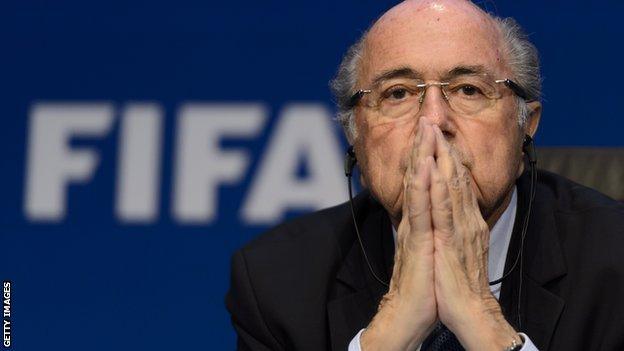
Sepp Blatter is now considering staying on as Fifa president
During the Cold War, analysts in the West had to decipher the politics of the Soviet Union using any small scrap of information they could find.
The order by which members of the ruling politburo were positioned at public appearances, the arrangement of articles in the state newspaper or the removal of portraits were poured over to extract an understanding of what was truly going on behind the Iron Curtain.
'Kremlinology' was thus born.
Trying to understand what is happening within Fifa right now is not too dissimilar.
No-one is comparing Sepp Blatter or football's world governing body to an insidious Communist state.
Let's be clear about that.
But parallels can be drawn to current levels of secrecy in Zurich.
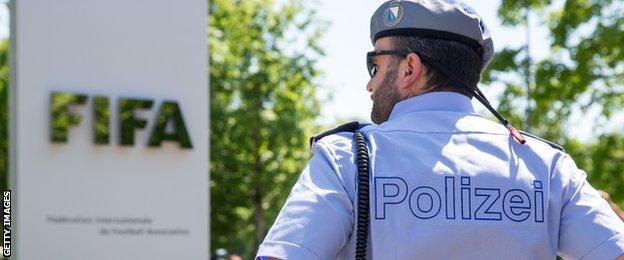
Blatter announced he was quitting in the wake of the FBI-led corruption investigation into Fifa
Then there are the statements that don't quite give the full picture and the power battles taking place behind closed doors.
Knowing what is truly going on inside Fifa's sprawling hillside complex is a tough task at the moment.
But there are clues.
Take Sunday's report in the Swiss newspaper Schweiz am Sonntag and BBC Sport's own story.
Both outline how Blatter is now considering staying on as Fifa president having received backing from African and Asian football associations.
It would be a radical move, given the clear intentions he set out in his dramatic speech on 2 June.
Sepp Blatter resigns as Fifa president saying new elections will be held soon
It was during that hastily arranged news conference that Blatter spoke about how his Fifa mandate did not extend throughout world football and he would therefore call for a new election.
Sunday's reports provoked a swift response from Domenico Scala, Fifa's independent head of audit and compliance.
He is effectively guiding the transition of power and was very clear that the current plan must be adhered to.
"For me, the reforms are the central topic," he said.
"That is why I think it is clearly indispensable to follow through with the initiated process of president's change as it has been announced. "
That message is not so difficult to understand and boils down to this - 'stick to the agreed plan, Sepp'.
The news that Blatter is thinking of staying comes just a few days after Fifa's communications chief Walter De Gregorio was forced out of the organisation. De Gregorio was sacked following a joke about the governing body on Swiss TV.
In light of Sunday's reports his ousting perhaps becomes easier to understand.
De Gregorio is thought to have favoured a low-key strategy for Blatter in his final few months in charge.
But a PR professional by the name of Klaus Stohlker has the ear of the Fifa president.
Stohlker criticised De Gregorio in an article to a Swiss magazine on 2 June and blamed him for Blatter's poor image.
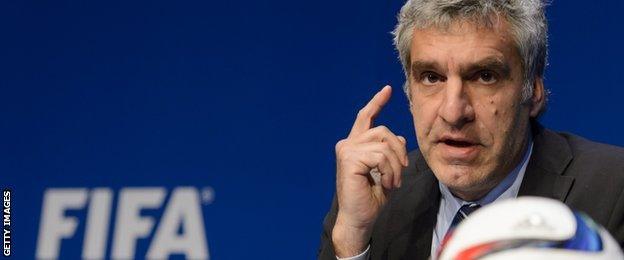
Walter De Gregorio was sacked by Fifa after making a joke about the governing body on Swiss TV
That report ultimately led to De Gregorio's departure when Blatter, after being confronted, refused to disavow the comments.
Fifa insist Stohlker's mandate to advise Blatter ended in May.
However Stohlker made on-record comments to Sky News on Monday outlining how Blatter remains a credible candidate for the new election.
Is he acting without authority? Or is this a ham-fisted attempt to test the water by Blatter?
As a long-time friend Stohlker advised the 79-year-old in the run-up to May's presidential election.
And his influence may be growing - despite Fifa's formal insistence he is not officially connected to Blatter.
Control of at least some of the message may well have changed hands.
With a reform programme to be implemented, an emergency executive committee to be held and an ideologically sound successor to be found, there is a lot still at stake for the man who has led Fifa since 1998.
Sepp Blatter's controversial career
He has no intention of leaving Fifa with a whimper or exiting the side door, having been humbled.
Blatter announced he was quitting in the wake of the FBI-led corruption investigation into Fifa and the arrest of several senior football officials.
With no sign of a US indictment against him Blatter may also feel emboldened.
Blatter could also feel indignant - given how many of his supporters feel the US investigations against football officials are an example of neo-imperialism.
Therefore his new strategy could be to try and ensure he remains as relevant as possible in the remaining time he has left as leader.
An example of this is the fact he's said to be keen to do television interviews again, albeit with Fifa's internal media team at first.
Ultimately, Blatter does not want to be a 'lame duck' - especially once the candidates to succeed him begin to campaign.
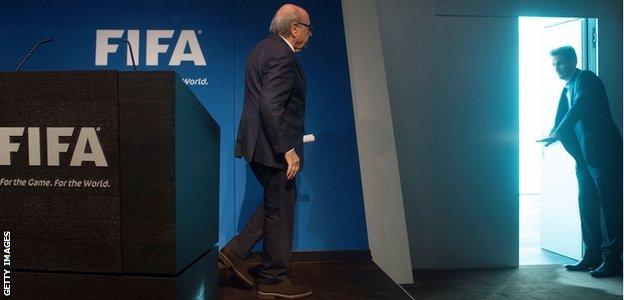
Blatter walks away after his resignation speech in Zurich
They will start to become prominent from July/August onwards - and it is their ideas and proposals which will dominate the presidential campaign and the headlines.
In the end, only Blatter can decide if he will defy his own word and stand again.
But what we could be witnessing right now is an attempt to assert control over the narrative concerning Fifa's future.
The other aim is to continue to organise a longed-for, dignified and, as strange as it may sound, triumphant exit at the emergency Fifa congress.
He may be fighting the dying of the light on his time at Fifa but Blatter still wants to be the one who ultimately decides when, and how, to extinguish the flame.
- Published15 June 2015
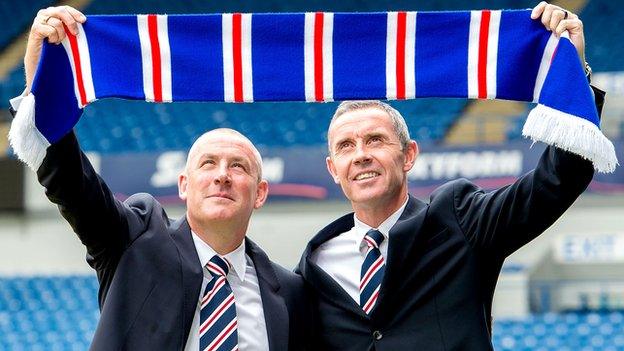
- Published16 June 2015
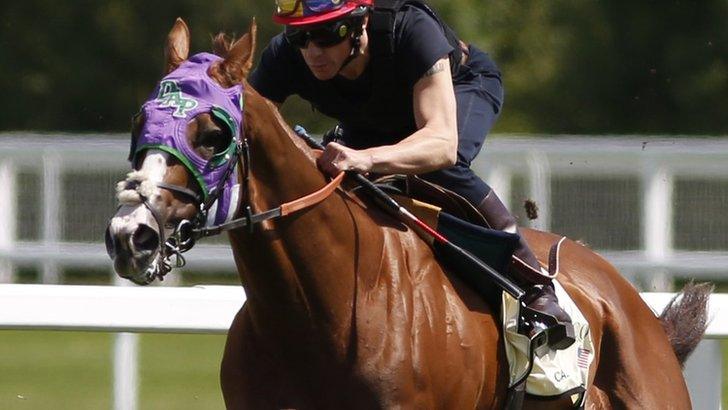
- Published14 June 2015
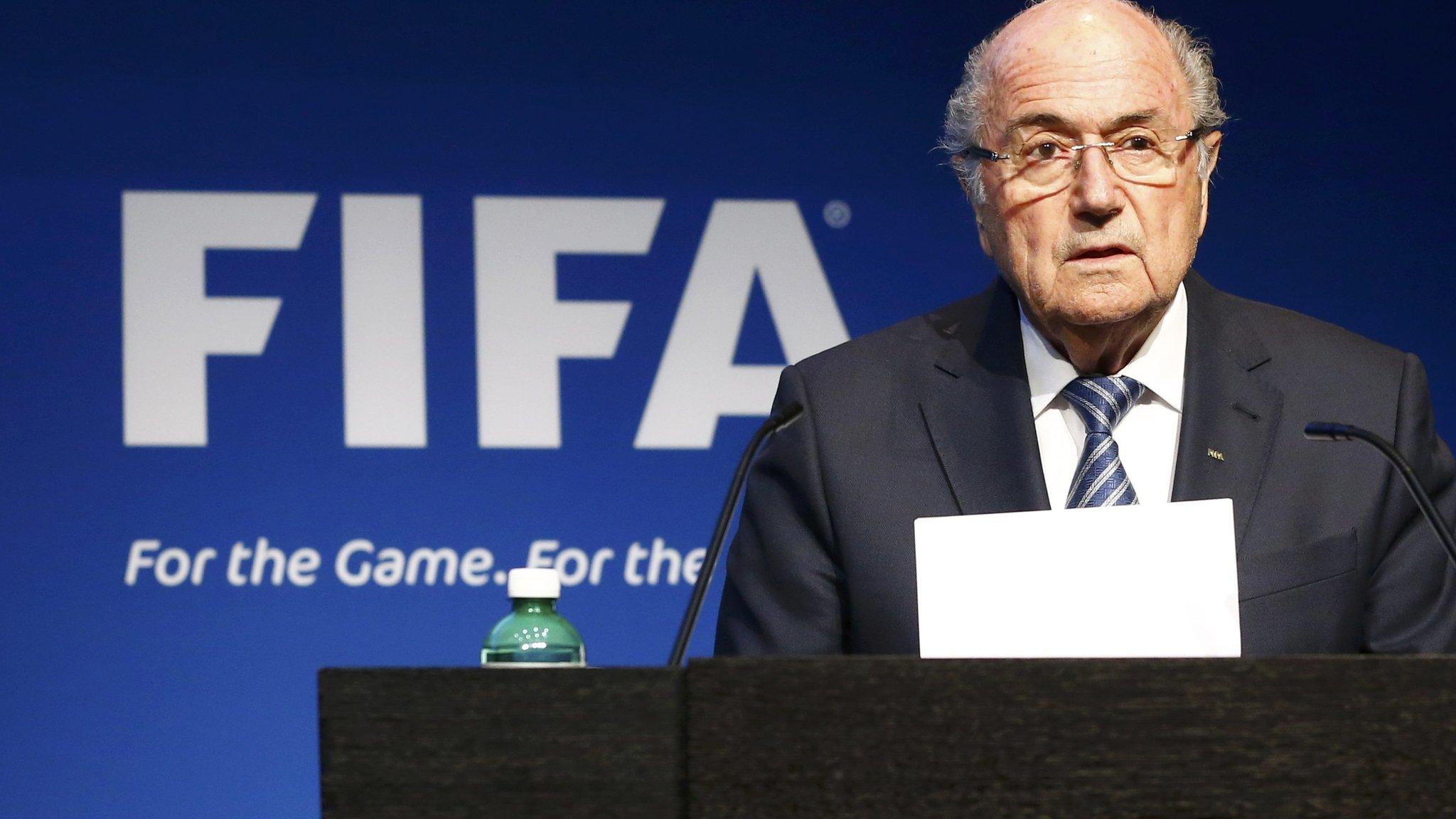
- Published11 June 2015
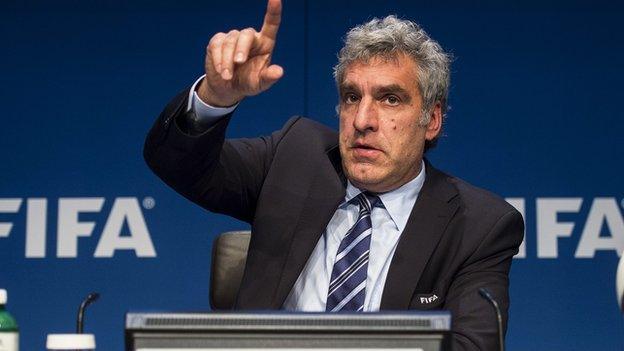
- Published2 June 2015
